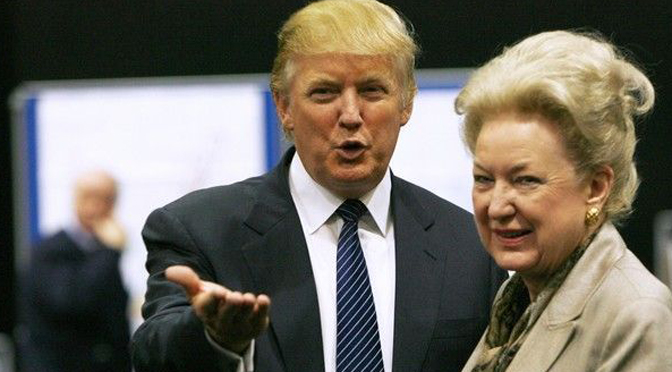On Wednesday, presumptive Republican presidential nominee Donald Trump released a list of eleven potential Supreme Court nominees he considers “representative of the kind of constitutional principles I value.”
Trump has also promised, “I won’t go beyond the list, and I’m going to let people know. Because some people say maybe I’ll appoint a liberal judge. I’m not appointing a liberal judge.”So far, the consensus in pro-life and constitutionalist circles is positive. The Susan B. Anthony List calls it “an exceptionally strong list of jurists with immense respect for our founding documents,” and law professor and ex-Bush Administration attorney John Yoo says it’s a “Federalist Society all-star list of conservative jurisprudence.” (And hey, at least his radical pro-abortion sister isn’t on the list.)
On the other hand, conservative pro-life columnist Quin Hillyer says while it’s “a very strong list,” “I trust this list as far as I can throw a rhinoceros.” National Review’s Dan McLaughlin also dismisses it as “mostly cribbed from a prior Heritage Foundation list and from names fed to Trump by Hugh Hewitt in a radio interview” and “obviously is not the product of much due diligence.”
But what about the names? All eleven are listed below, along with whatever specific information we can dig up about their pro-life credentials and constitutional philosophy.
8th Circuit Judge Steven Colloton—A jurist who has ruled in favor of informed-consent requirements for abortion and against forcing employers to cover contraceptives.
Colorado Supreme Court Justice Allison Eid—A former clerk for the great pro-life Justice Clarence Thomas and speechwriter for Ronald Reagan’s pro-life Education Secretary Bill Bennett, in 2013 Eid voted to hear the appeal of an injunction against public displays of graphic abortion images (although voting to hear the case is not a vote on the case’s merits, ruling the other way was a de facto vote to let the injunction stand).
8th Circuit Judge Raymond Gruender—Like Colloton, Gruender sided with pro-lifers on informed consent and forced contraception coverage.
3rd Circuit Judge Thomas Hardiman—A jurist who has described his judicial philosophy as follows: “our role as judges is to interpret the law, not to inject our own policy preferences […] any good judge recognizes his or her place in our constitutional government, and that place is not to upset the will of the people as expressed through their elected representatives.”
6th Circuit Judge Raymond Kethledge—A Judge who has described his judicial philosophy as “follow[ing] Supreme Court precedent” “first and foremost” (a potential problem if it means excessive deference for bad precedent such as Roe v. Wade), but also “mak[ing] sure that the values that I would be enforcing if I were a judge are not just my values, that I am not striking something down simply because I don’t like it,” and “start[ing] with the text. I would say that, sir.”
Michigan Supreme Court Justice Joan Larsen—A former clerk of pro-life hero Justice Antonin Scalia, who called her former boss “one of the greatest legal minds of our era” with “a commitment to reading the law faithfully and applying the law as written.”
Utah Supreme Court Justice Thomas Lee—The brother of strong pro-life Senator Mike Lee, Justice Lee ruled in 2011 that fetuses qualified as “minor children” under the state’s wrongful death law.
11th Circuit Judge William Pryor—A name Trump has mentioned before, and a respected pro-life jurist who called Roe v. Wade “the worst abomination in the history of constitutional law” (a declaration with which many pro-abortion legal scholars agree). A solid choice.
Minnesota Supreme Court Justice David Stras—Another former Thomas clerk, in 2009 Stras criticized as unfair Ted Kennedy’s infamous declaration that “Robert Bork’s America is a land in which women would be forced into back-alley abortions.”
7th Circuit Judge Diane Sykes—Another name Trump first floated months ago, who is disturbingly still in consideration despite striking down Indiana’s 2012 attempt to defund Planned Parenthood. Pro-lifers have pointed this out repeatedly over the past several months, so it’s not a good sign that neither Trump nor anyone else on his team was listening.
Texas Supreme Court Justice Don Willett—A judge who has said a court’s role is “not to aggrandize power or impose their own policy preferences,” and that a “court squanders that legitimacy when it stiff-arms the law to reach wished-for policy outcomes,” because “law isn’t wet clay that a willful, activist judge can mold into whatever outcome he finds more fashionable, politically enticing, or ideologically satisfying.” However, it turns out Willet’s also a recurring Trump critic, so pro-lifers probably shouldn’t expect him to be nominated anyway.
So it’s definitely an encouraging list, but real question is whether Trump would actually follow through and nominate these people. As Ramesh Ponnuru explains, a lot of skepticism remains because (among other reasons):
[H]e often says he wants to make deals and that conservatism is a second-order concern for him, and making deals with the Democrats on judges would preclude fighting for judicial conservatives. (Trump’s interest in getting conservative judges on the bench is in doubt; the Democrats’ interest in blocking them is not.) Fifth, because he has frequently broken his word and casually abandoned his previously stated positions.
On the other hand, giving us specific names increases the likelihood at least somewhat, simply because we now have clear markers by which to evaluate his performance. So the vetting continues.







